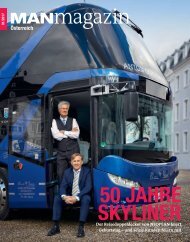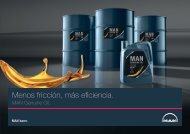MDT Image Magazine
The MAN Diesel and Turbo image magazine "ENCOUNTER" in English
The MAN Diesel and Turbo image magazine "ENCOUNTER" in English
Create successful ePaper yourself
Turn your PDF publications into a flip-book with our unique Google optimized e-Paper software.
a bridge<br />
to the future<br />
THE IMPORTANCE of natural gas is rising rapidly among<br />
the fossil fuels.<br />
Following coal in the 19th century and oil in the 20th, is gas now assuming the mantle as the key fossil<br />
fuel? The International Energy Agency (IEA) thinks so at any rate and has already dubbed the 21st century<br />
the “Golden Age of Gas”. And the fact is that if the current growth trend continues, natural gas will<br />
overtake coal and oil in the next ten to twenty years, to judge by its share of global primary energy consumption.<br />
One thing is certain – thanks to its high level of availability, its versatility and its comparatively benign<br />
effect on the environment, natural gas will become increasingly important to all key applications such<br />
as transportation and the provision of power and heat. Low-pollutant combustion – as far as possible<br />
devoid of dust, soot and sulfur – and low CO 2 emissions are central arguments in favor of gas.<br />
This process starts right at the beginning of the natural gas value creation chain. Turbomachinery is in<br />
operation across the globe to ensure that natural gas can be extracted safely, efficiently and reliably.<br />
Compressors and turbines likewise play a vital role in subsequent transportation, conditioning and further<br />
processing to produce chemical feedstocks or liquid fuels – and demand is growing.<br />
This is because natural gas is becoming increasingly widespread as a fuel in road, rail and especially<br />
maritime transport. Natural gas is transported globally to a growing extent in the form of Liquefied<br />
Natural Gas (LNG). This is an attractive alternative to gas pipelines, especially where large distances are<br />
involved, and customers are not tied to one supplier. LNG tankers and other types of vessels are now<br />
propelled by gas or dual fuel engines. As the global LNG infrastructure becomes more dense, it is foreseeable<br />
that liquefied natural gas will also offer an economical, environmentally friendly alternative fuel<br />
source for a host of other types of ships. Approximately half of the world‘s shipping traffic is now powered<br />
by a wide variety of MAN ship propulsion systems. Gas engines account for a rapidly growing share<br />
of this figure.<br />
In heat and power generation, decentralized solutions will increasingly ensure an energy supply for the<br />
future in light of a rapidly growing proportion of regenerative energy sources – and not just in Germany,<br />
although this is a prime example. In the wake of its decision, enshrined in law, to phase out nuclear energy<br />
by 2022, the Federal Republic is pursuing a particularly ambitious goal: to increase the proportion<br />
38 Encounter


















